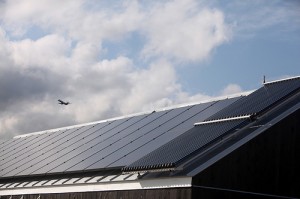Two Teams Tie to Win New Affordability Contest at U.S. Department of Energy Solar Decathlon 2011

“By initiating the Affordability Contest this year, we wanted to emphasize that many of the energy-efficient features in these amazing houses are within reach of many Americans,” said Richard King, director of the Solar Decathlon for the U.S. Department of Energy. “Most of the energy-efficient designs and products on display this week are affordable, and they can help anyone save money at home.”
Teams earned the full 100 points for achieving a target construction cost of $250,000 or less, as evaluated by a professional estimator. A sliding point scale was applied to teams with estimated house construction costs between $250,001 and $600,000. No points were awarded to any house that cost over $600,000.
Parsons NS Stevens (Parsons The New School for Design and Stevens Institute of Technology) and Purdue tied for first and earned the full 100 points in the contest by constructing houses estimated to cost $229,890 and $249,596, respectively. Team Belgium earned second place and 99.885 points with a house estimated to cost $251,147. Placing third in the contest, SCI-Arc/Caltech earned 98.750 points with a house estimated to cost $262,495. Full details on the cost estimates for each house are posted at www.SolarDecathlon.gov.
Affordability Juror Matt Hansen, founder of Takeoffs Construction Estimating and partner at Licata Hansen Associates Architecture, said, “Parsons NS Stevens truly exemplified the can-do attitude. The house is based on the affordability needs of the team’s target market in an urban context: low initial costs, low maintenance costs, and low utility costs.” Along with nationally recognized architect Ric Licata, fellow and current Western Regional Director of the American Institute of Architects, Hansen has spent time over the last nine months evaluating each team’s house to determine accurate cost estimates for the contest. Hansen continued, “Purdue’s use of a traditional design and construction approach demonstrated high tech energy and control systems for a sophisticated yet conventional market. The general public would not perceive it as a solar home.”
During the award presentation, the Affordability jury told students, “Do not let future employers or clients tell you ‘It can’t be done.’ Never let anyone say you can’t build an affordable, energy-efficient house that produces as much energy as it consumes – for the Solar Decathlon 2011, you have designed attractive homes to do just that.”
Following the Affordability Contest results, Purdue is in first place overall, Ohio State is in second place and Maryland is in third place. Parsons NS Stevens jumped from eighth to fourth place in the overall rankings.
The Solar Decathlon comprises 10 contests – each worth 100 points – that evaluate affordability, architecture, engineering, market appeal, comfort, appliances, and the level of energy produced versus energy consumed, among other competition aspects.
Results from the Architecture Contest, also worth 100 points, will be announced Wednesday September 28 at 3:15 pm in the U.S. Capitol Visitor Center on Capitol Hill in Washington, D.C. The Solar Decathlon’s overall winner will be announced on Saturday, October 1, at 2:30 pm in the solar village at the National Mall’s West Potomac Park.
The Department of Energy Solar Decathlon is open to the public through Sunday, October 2. The houses are open for free tours each weekday from 10:00 am to 2:00 pm, and on weekends from 10:00 am to 5:30 pm. For full event information, current standings, high-resolution photos, videos, an event schedule and daily results, visit www.SolarDecathlon.gov. You can also follow the competition real-time on Facebook at Facebook.com/DOESolarDecathlon and Twitter at @Solar_Decathlon.